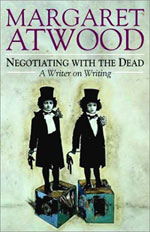
All of Guinness’ memoirs – Blessings in Disguise, My Name Escapes Me and A Positively Final Appearance – are wry, funny, observant, wistful at times and utterly fascinating.


All of Guinness’ memoirs – Blessings in Disguise, My Name Escapes Me and A Positively Final Appearance – are wry, funny, observant, wistful at times and utterly fascinating.

This book is disorienting, disturbing, haunting and compelling both in plot and character development. It is richly deserving of its IMPAC recognition.

Margaret Atwood made me get teary-eyed on the subway while reading this book.
“Negotiating With the Dead” is a reflection on the roles of writers and their readers, adapted and somewhat expanded from the Empson Lectures which Margaret Atwood delivered at Cambridge University in 2000. It is breathtakingly erudite and eclectic, but is also interwoven with very personal and down-to-earth recollections and episodes from Atwood’s own journey as both a writer and a reader. It was a sweet reminiscence about the person whom she considered to be her first reader – and who she later paid tribute to with an appearance in one of her novels – that brought on my moved and appreciative tears. It also drove home that the audience and the individual reader are critical figures in the symbiosis of the writer’s creative process.
This book brims with examples from the classical to the contemporary of the multifaceted and sometimes conflicted roles, challenges and opportunities of the writer. At the same time, much of it has a conversational tone that undoubtedly stems from both its origin as a series of lectures, but also Atwood’s strong and singular voice. Some might count that as a flaw of this work, in that the overall voice is somewhat inconsistent, but I think that’s part of its charm and makes the subject matter that much more approachable, digestible and memorable.
Negotiating With the Dead is one of the Canadian non-fiction titles I’ve recommended for Canada Reads 2012: True Stories. If you’d like to support this book as a possible Canada Reads finalist, you can vote for it here, as well as perusing some other great recommendations.

Towards the end of the book, the story tries too literally to layer one shock on top of another, to the point that it would be laughable if it wasn’t so sad. I guess the reader is made to care a little bit because of what happened to the author, but nothing in the book makes you care about any of the sorry, tedious characters.

Sweet and whimsical … Now, why doesn’t someone nominate this for Canada Reads?

This is an adorable (but not cloyingly so), whimsical book with a great message about how we shouldn’t judge individuals and their seeming foibles. The illustrations are rich, colourful and have a lot of depth and character to them.

Jonathan Safran Foer has a gift for unique, unforgettable narrative voices. Amongst the multiple generations fighting to survive oppression and war on many fronts, there are innumerable vivid scenes and characters.

The lack of sentimentality – of both the heroine and the telling of her tale – actually works to this book’s advantage, making it a crisp, quick and even enjoyable read, some of the disturbing scenes and situations notwithstanding. The perhaps workmanlike tidiness of sewing up each character and storyline is balanced by the fact that not each resolution is conventionally happily ever after. Not a masterpiece, but not bad at all.

This is quintessential Wharton. People live within social constraints and perceptions, but still make tolerable lives for themselves despite compromises. However, those compromises bring heartbreak … and sometimes surprising revelations and tenderness. This tale is told in the inimitable crisp but still affecting Wharton style.

Lorrie Moore puts good-hearted Tassie Keltjin, protagonist of “A Gate at the Stairs”, through an improbable amount of complex heartache in a short period of time. Tassie leaves her quirky family’s Midwestern organic farm to attend college in the fall of 2001. Only passing (and actually, rather refreshingly flippant) reference is made to what we all know happened that fall, but somehow it still manages to bring a sense of bewilderment and vague emotional paralysis coupled with yearning to all of Tassie’s interactions in the ensuing months.
Gates and stairs, literal and figurative, do indeed show up regularly in this wry, haunting novel. The reader and Tassie realize perhaps too late that she has most longed to climb stairs and open gates where she wasn’t wanted, needed or fully appreciated. After the fact, she questions with more insight and self-awareness whether or not she established any real connections with the people she encountered during that pivotal year, or just experienced some “random obviousness shared between strangers”. Ironically, whether it was random or not, it wasn’t obvious, at least not to the trusting and strangely optimistic Tassie. Also ironically, where it is clearly obvious that with a bit of communication on her part, she can save people she loves and who love her, she doesn’t. In one case, tragedy is averted, but in another, it isn’t. Perhaps all this then sounds like a downer of a book featuring a frustrating and hapless heroine. Strangely but wonderfully, in Moore’s skilful and compassionate rendering, it is not only *not* that, but surprisingly optimistic at the end. “A Gate at the Stairs” is engrossing and engaging throughout Tassie’s journey to self-awareness, confidence and maturity.